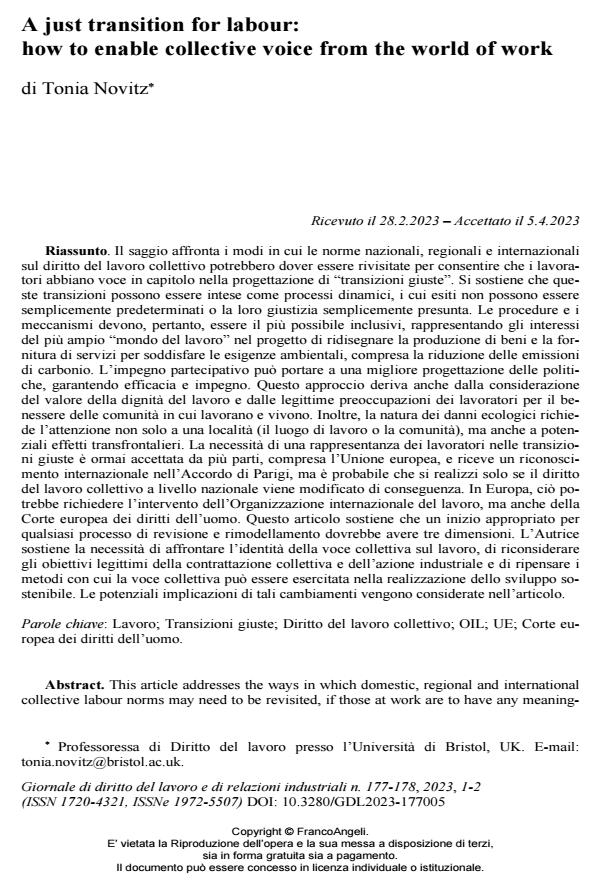A just transition for labour: how to enable collective voice from the world of work
Journal title GIORNALE DI DIRITTO DEL LAVORO E DI RELAZIONI INDUSTRIALI
Author/s Tonia Novitz
Publishing Year 2023 Issue 2023/177-178
Language English Pages 19 P. 55-73 File size 256 KB
DOI 10.3280/GDL2023-177005
DOI is like a bar code for intellectual property: to have more infomation
click here
Below, you can see the article first page
If you want to buy this article in PDF format, you can do it, following the instructions to buy download credits

FrancoAngeli is member of Publishers International Linking Association, Inc (PILA), a not-for-profit association which run the CrossRef service enabling links to and from online scholarly content.
This article addresses the ways in which domestic, regional and international collective labour norms may need to be revisited, if those at work are to have any meaningful voice in the design of "just transitions". It is argued that these transitions can be understood as dynamic pro-cesses, the outcomes of which cannot be simply pre-determined or their justice merely as-sumed. It therefore makes sense for associated procedures and mechanisms to be as inclusive as possible, representing interests of the wider “world of work” in the project of recrafting the manufacture of goods and delivery of services to meet environmental needs, including the re-duction of carbon emissions. Participatory engagement is likely to lead to better policy design, ensuring effectiveness and commitment. This approach also follows from appreciation of the dignity of labour and the legitimate concerns of those at work with the welfare of the commu-nities in which they work and live. Moreover, the nature of ecological harms require attention to not merely one locality (the workplace or the community) but potential for transborder ef-fects. The case for labour representation in just transitions is now accepted in many quarters, including the European Union (EU), and receives international recognition in the Paris Agreement, but is only likely to be realisable if national level collective labour law is changed accordingly. In Europe, that may require prompts from the International Labour Organization (ILO), but also the European Court of Human Rights. This article argues that an appropriate beginning for any process of revision and remodelling would have three dimensions. Firstly, I advocate addressing the identity of collective voice at work, reconsidering the legitimate objec-tives of collective bargaining and industrial action, and rethinking the methods by which col-lective voice can be exercised in the realisation of sustainable development. The potential im-plications of such changes are considered here.
Keywords: Work; Just transitions; Collective labour law; ILO; EU; European Court of Human Rights.
- Workers on the front line of climate change: Re-politicizing trade union climate action Ben CRAWFORD, David WHYTE, in International Labour Review /2025
DOI: 10.16995/ilr.18838 - Green Transition and the Quality of Work Edoardo Ales, pp.15 (ISBN:978-3-031-68199-8)
- Il contratto collettivo dei metalmeccanici nel sistema di relazioni industriali: intuizioni e innovazioni alla prova dei fatti Giulio Centamore, Andrea Lassandari, Federico Martelloni, Valeria Nuzzo, in GIORNALE DI DIRITTO DEL LAVORO E DI RELAZIONI INDUSTRIALI 180/2024 pp.593
DOI: 10.3280/GDL2023-180005 - Los trabajadores frente al cambio climático. Repolitización de la acción climática sindical Ben CRAWFORD, David WHYTE, in Revista Internacional del Trabajo /2025
DOI: 10.16995/ilrs.18838 - Impresa e transizione ecologica: alcuni profili lavoristici Valerio Speziale, in GIORNALE DI DIRITTO DEL LAVORO E DI RELAZIONI INDUSTRIALI 179/2023 pp.283
DOI: 10.3280/GDL2023-179001 - Les travailleurs en première ligne du changement climatique: repolitiser l’action syndicale pour le climat Ben CRAWFORD, David WHYTE, in Revue internationale du travail /2025
DOI: 10.16995/ilrf.18838
Tonia Novitz, A just transition for labour: how to enable collective voice from the world of work in "GIORNALE DI DIRITTO DEL LAVORO E DI RELAZIONI INDUSTRIALI " 177-178/2023, pp 55-73, DOI: 10.3280/GDL2023-177005